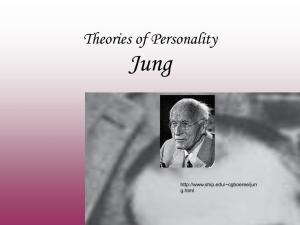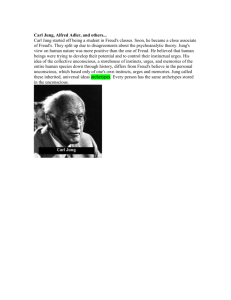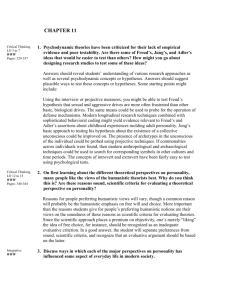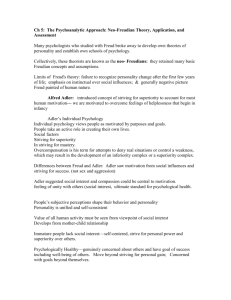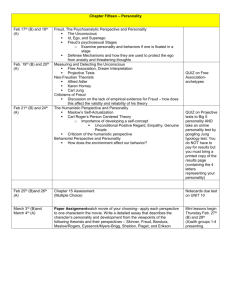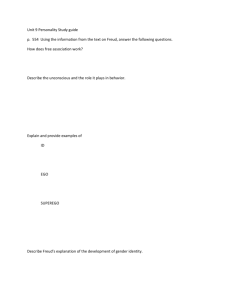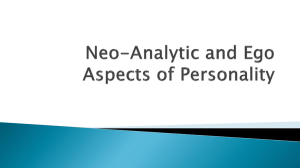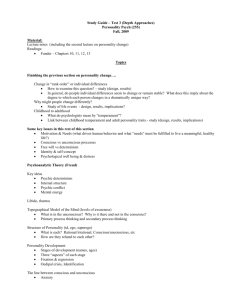Upon completion, the student will be able to
advertisement
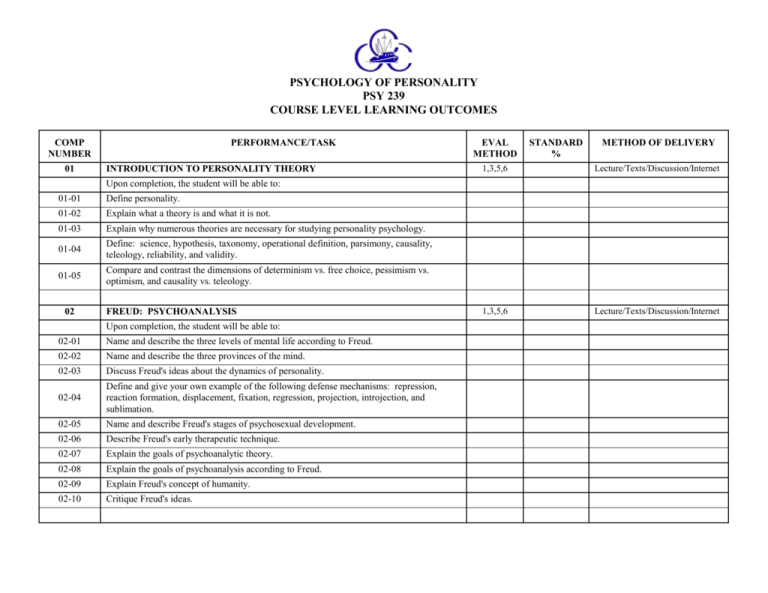
PSYCHOLOGY OF PERSONALITY PSY 239 COURSE LEVEL LEARNING OUTCOMES COMP NUMBER 01 PERFORMANCE/TASK INTRODUCTION TO PERSONALITY THEORY EVAL METHOD STANDARD % METHOD OF DELIVERY 1,3,5,6 Lecture/Texts/Discussion/Internet 1,3,5,6 Lecture/Texts/Discussion/Internet Upon completion, the student will be able to: 01-01 Define personality. 01-02 Explain what a theory is and what it is not. 01-03 Explain why numerous theories are necessary for studying personality psychology. 01-04 Define: science, hypothesis, taxonomy, operational definition, parsimony, causality, teleology, reliability, and validity. 01-05 Compare and contrast the dimensions of determinism vs. free choice, pessimism vs. optimism, and causality vs. teleology. 02 FREUD: PSYCHOANALYSIS Upon completion, the student will be able to: 02-01 Name and describe the three levels of mental life according to Freud. 02-02 Name and describe the three provinces of the mind. 02-03 Discuss Freud's ideas about the dynamics of personality. 02-04 Define and give your own example of the following defense mechanisms: repression, reaction formation, displacement, fixation, regression, projection, introjection, and sublimation. 02-05 Name and describe Freud's stages of psychosexual development. 02-06 Describe Freud's early therapeutic technique. 02-07 Explain the goals of psychoanalytic theory. 02-08 Explain the goals of psychoanalysis according to Freud. 02-09 Explain Freud's concept of humanity. 02-10 Critique Freud's ideas. COMP NUMBER 03 PERFORMANCE/TASK JUNG: ANALYTICAL PSYCHOLOGY EVAL METHOD 1,3,5,6 STANDARD % METHOD OF DELIVERY Lecture/Texts/Discussion/Internet Upon completion, the student will be able to: 03-01 Name and explain the two levels of the psyche according to Jung. 03-02 Name and explain archetypes. 03-03 Explain Jung's ideas about the dynamics of personality. 03-04 Explain the typology of the psyche making sure to define attitude, introversion, extraversion, function, thinking, feeling, sensation, intuition, rational and irrational functions. 03-05 Explain the development of personality according to Jung. Comment on the stages of development. 03-06 Describe Jung's methods of investigation of personality. 03-07 Explain the applications of psychotherapy according to Jung. 03-08 Explain Jung's concept of humanity. 03-09 Critique Jung's ideas. 03-10 Compare and contrast Jung and Freud's theories. 04 ADLER: INDIVIDUAL PSYCHOLOGY Upon completion, the student will be able to: 04-01 Explain Adler's concept of striving for success or superiority. 04-02 Explain how Adler believes subjective perceptions shape behavior and personality. 04-03 Describe Adler's concept of unity of the personality. 04-04 Discuss the importance of social interest according to Adler. 04-05 Explain what Adler means by one's style of life. How is one's style of life developed? 04-06 How does Adler view abnormal development? What factors impact maladjustment? 04-07 Describe Adler's concepts of safe guarding tendencies. What purpose do they serve? 04-08 Discuss the practical applications of Individual Psychology. 04-09 Explain Adler's concept of humanity. 04-10 Critique Adler's ideas. 04-11 Compare and contrast Freud, Jung, and Adler's theories. 1,3,5,6 Lecture/Texts/Discussion/Internet COMP NUMBER 05 PERFORMANCE/TASK KLEIN: OBJECT RELATIONS THEORY EVAL METHOD 1,3,5,6 STANDARD % METHOD OF DELIVERY Lecture/Texts/Discussion/Internet Upon completion, the student will be able to: 05-01 Explain object relations theory. 05-02 Describe the psychic life of the infant according to Klein. 05-03 Discuss the use and types of positions according to Klein. 05-04 Explain Klein's psychic defense mechanisms. 05-05 Describe the Klein's concepts of internalizations, ego, superego, and the Oedipus complex. 05-06 Compare and contrast male and female Oedipal development according to Klein. 05-07 Explain Mahler's view of object relations theory. 05-08 Explain Kernberg's view of object relations theory. 05-09 Explain Kohut's view of object relations theory. 05-10 Describe Bowlby's attachment theory. 05-11 Identify the aim of Kleinian therapy and how it is applied. 05-12 Explain Klein's concept of humanity. 05-13 Critique Klein's ideas. 05-14 Compare and contrast Freud, Jung, Adler, and Klein's theories. 06 HORNEY: PSYCHOANALYTIC SOCIAL THEORY Upon completion, the student will be able to: 06-01 Explain Horney's Psychoanalytic Social Theory. 06-02 Define basic hostility and basic anxiety. 06-03 Describe Horney's concept of compulsive drives, neurotic needs, and neurotic trends. 06-04 Explain intrapsychic conflicts, idealized self-image, neurotic search for glory, neurotic claims, neurotic pride, and self-hatred. 06-05 Describe Horney's view of psychoanalytic psychology and feminine psychology. 06-06 Discuss the goals of Horneyian therapy and its uses. 06-07 Explain Horney's view of humanity. 06-08 Critique Horney's ideas. 06-09 Compare and contrast Freud, Jung, Adler, Klein, and Horney's theories. 1,3,5,6 Lecture/Texts/Discussion/Internet COMP NUMBER 07 PERFORMANCE/TASK FROMM: HUMANISTIC PSYCHOANALYSIS EVAL METHOD STANDARD % METHOD OF DELIVERY 1,3,5,6 Lecture/Texts/Discussion/Internet 1,3,5,6 Lecture/Texts/Discussion/Internet Upon completion, the student will be able to: 07-01 Explain Fromm's basic assumptions. 07-02 Discuss the important human needs according to Fromm. 07-03 Explain why Fromm views freedom as a burden. 07-04 Explain why Fromm's concept of character orientations including nonproductive orientations and a productive orientation. 07-05 Describe Fromm's view and types of personality disorders. 07-06 Discuss humanistic psychoanalysis. 07-07 Describe Fromm's methods of investigation. 07-08 Explain and give an example of Fromm's concept of psychohistory or psychobiography. 07-09 Explain Fromm's concept of humanity. 07-10 Critique Fromm's ideas. 07-11 Compare and contrast Freud, Jung, Adler, Klein, Horney, and Fromm's theories. 08 INTERPERSONAL THEORY Upon completion, the student will be able to: 08-01 Describe Sullivan's interpersonal theory. 08-02 Define and give examples of tensions, needs, dynamism, and personifications according to Sullivan. 08-03 Discuss the three levels of cognition according to Sullivan. 08-04 Describe Sullivan's seven stages of development. 08-05 Explain Sullivan's view of mental disorders. 08-06 Describe how Sullivan viewed and conducted psychotherapy. 08-07 Explain Sullivan's concepts of humanity. 08-08 Critique Sullivan's ideas. 08-09 Compare and contrast Freud, Jung, Adler, Klein, Horney, Fromm, and Sullivan's theories. COMP NUMBER 09 PERFORMANCE/TASK ERIKSON: POST-FREUDIAN THOERUY EVAL METHOD STANDARD % METHOD OF DELIVERY 1,3,5,6 Lecture/Texts/Discussion/Internet 1,3,5,6 Lecture/Texts/Discussion/Internet 1,3,5,6 Lecture/Texts/Discussion/Internet Upon completion, the student will be able to: 09-01 Describe Erikson's Ego Psychology. 09-02 Describe Erikson's eight stages of psychosocial development. 09-03 Discuss the crisis of each of the eight stages of psychosocial development. 09-04 Describe Erikson's methods of investigation. 09-05 Define psychohistory according to Erikson. 09-06 Explain Erikson's concept of humanity. 09-07 Critique Erikson's ideas. 09-08 Compare and contrast Freud, Jung, Adler, Klein, Horney, Fromm, Sullivan, and Erikson's theories. 10 SKINNER: BEHAVIORAL ANALYSIS Upon completion, the student will be able to: 10-01 Describe Skinner's Scientific Behaviorism. 10-02 Explain and give examples of the concepts of operant conditioning. 10-03 Discuss the forces that shape human behavior according to Skinner. 10-04 Discuss how unhealthy personalities develop according to Skinner. 10-05 Describe Skinner's view of psychotherapy. 10-06 Explain Skinner's concept of humanity. 10-07 Critique Skinner's ideas. 11 BANDURA: SOCIAL COGNITIVE THEORY Upon completion, the student will be able to: 11-01 Describe Bandura's Social Cognitive Theory. 11-02 Explain and give examples of reciprocal determinism, self system, self efficacy, and learning according to Bandura. 11-03 Discuss observational learning. 11-04 Explain how dysfunctional behavior develops according to Bandura. 11-05 Describe Bandura's views on psychotherapy. 11-06 Explain Bandura's concept of humanity. 11-07 Critique Bandura's ideas. 11-08 Compare and contrast Skinner and Bandura's theories. COMP NUMBER 12 PERFORMANCE/TASK ROTTER AND MISCHEL: COGNITIVE SOCIAL LEARNING THOERY EVAL METHOD STANDARD % METHOD OF DELIVERY 1,3,5,6 Lecture/Texts/Discussion/Internet 1,3,5,6 Lecture/Texts/Discussion/Internet Upon completion, the student will be able to: 12-01 Describe Rotter's Social Learning Theory. 12-02 Name and give examples of Rotter's variables of prediction. 12-03 Explain Rotter's basic prediction formula. 12-04 Define and give examples of generalized expectancies. 12-05 Define maladaptive behavior according to Rotter. 12-06 Explain the role of psychotherapy according to Rotter. 12-07 Describe Mischel's Cognitive Social Theory. 12-08 Explain Mischel's conditional view of personal dispositions. 12-09 Explain the consistency paradox, the cognitive-affective personality system, and the prediction of behavior according to Mischel. 12-10 Explain Rotter and Mischel's concept of humanity. 12-11 Critique Rotter and Mischel's ideas. 12-12 Compare and contrast Skinner, Bandura, Rotter, and Mischel's theories. 13 CATTEL AND EYSENCK: TRAIT AND FACTOR THEORIES Upon completion, the student will be able to: 13-01 Explain the use of factor analysis to identify traits. 13-02 Describe Cattell's Trait theory. 13-03 Differentiate source, surface, and dynamic traits. Give examples. 13-04 Discuss Cattell's views on the genetic basis of traits. 13-05 Describe Eysenck's factor theory. 13-06 Explain how Eysenck measures personality. 13-07 Describe the three major types of personality and their polar opposites. Give examples. 13-08 Define the diathesis-stress model. 13-09 Explain Cattell and Eysenck's concept of humanity. 13-10 Critique Cattell and Eysenck's ideas. COMP PERFORMANCE/TASK EVAL STANDARD METHOD OF DELIVERY NUMBER 14 METHOD ALLPORT: PSYCHOLOGY OF THE INDIVIDUAL % 1,3,5,6 Lecture/Texts/Discussion/Internet 1,3,5,6 Lecture/Texts/Discussion/Internet 1,3,5,6 Lecture/Texts/Discussion/Internet Upon completion, the student will be able to: 14-01 Describe Allport's approach to personality study. 14-02 Explain how Allport went about defining personality and why. 14-03 Discuss the units and levels of personality according to Allport. 14-04 Explain Allport's use of theories of motivation in personality measurement and development. 14-05 Describe the growth of personality according to Allport. 14-06 Explain how Allport planned to use case study analysis in the study of personality. 14-07 Explain Allport's concept of humanity. 14-08 Critique Allport's ideas. 14-09 Compare and contrast Cattell, Eysenck, and Allport's theories. 15 KELLY: PSYCHOLOGY OF PERSONAL CONSTRUCTS Upon completion, the student will be able to: 15-01 Describe Kelly's philosophical position. 15-02 Explain and give examples of each of the personal constructs according to Kelly. 15-03 Discuss the use of personal construct theory in abnormal development, psychotherapy, and the Rep test. 15-04 Explain Kelly's concept of humanity. 15-05 Critique Kelly's ideas. 16 ROGERS: PERSON-CENTERED THEORY Upon completion, the student will be able to: 16-01 Describe Roger's person-centered theory. 16-02 Explain the basic assumptions of person-centered theory. 16-03 Describe Roger's client-centered therapy. 16-04 Explain Roger's concept of the person of tomorrow. 16-05 Discuss Roger's philosophy of science. 16-06 Discuss the Chicago study. 16-07 Explain Roger's concept of humanity. 16-08 Critique Roger's ideas. COMP NUMBER PERFORMANCE/TASK EVAL METHOD STANDARD % METHOD OF DELIVERY 17 MASLOW: HOLISTIC-DYNAMIC THEORY 1,3,5,6 Lecture/Texts/Discussion/Internet 1,3,5,6 Lecture/Texts/Discussion/Internet Upon completion, the student will be able to: 17-01 Describe Maslow's Holistic-Dynamic theory. 17-02 Explain Maslow's view of motivation. 17-03 Define self-actualization. 17-04 Describe Maslow's philosophy of science. 17-05 Explain Maslow's research methods for studying personality. 17-06 Describe the measurement of self-actualization. 17-07 Discuss the applications of Maslow's theory. 17-08 Explain Maslow's concept of humanity. 17-09 Critique Maslow's ideas. 17-10 Compare and contrast Rogers and Maslow's theories. 18 MAY: EXISTENTIAL PSYCHOLOGY Upon completion, the student will be able to: 18-01 Describe May's existential psychology. 18-02 Explain existentialism and its basic concepts. 18-03 Discuss the case of Phillip. 18-04 Discuss the power of myth according to May. 18-05 Explain the development of psychopathology according to May. 18-06 Explain the purpose of psychotherapy according to May. 18-07 Explain May's concept of humanity. 18-08 Critique May's ideas. 18-09 Compare and contrast Rogers, Maslow, and May's theories.
